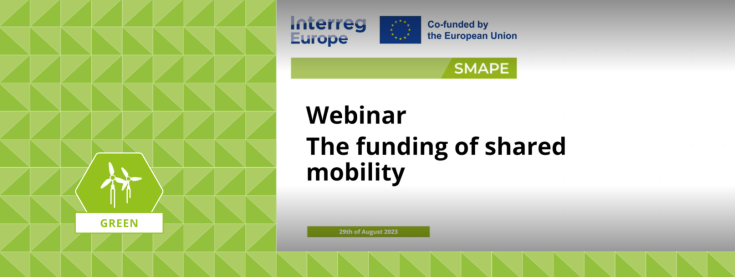Get down to business! Funding models for shared mobility

The SMAPE project keeps working during summer to make shared mobility better. To share knowledge, exchange ideas, and talk about the positive effects of shared transportation, SMAPE is organizing a series of online meetings. As SMAPE keeps moving forward, this time partners discussed how to come up with new ways to get funding and organize shared mobility services, bringing together some innovative cases.
Bergen's Bike-Sharing Journey
The workshop discussed Bergen's bike-sharing system, from its history and challenges to its successes and prospects. Grieg Einar Johan from the city of Bergen explained how the city started trials for bike-sharing in partnership with Clear Channel and conducted successful trials involving 100 and 200 bikes. The city council rejected advertising-funded models and opted for city funding, with a significant amount coming from a state-provided reward fund. The system, which includes 1,000 bikes, 2,000 locks, and 100 locations, costs 7.7 million Norwegian kronor annually and has been operational since 2018, with a contract until 2026. Despite a 50% reduction in bike usage after the introduction of e-scooters, Bergen’s bike sharing system still sees more trips per bike per day than e-scooters. As a matter of fact, it has risen the number of new cyclists in the city. Plans include an extension to the suburbs, testing e-bikes, and better integration with public transport. The ending contract in 2026 raises questions about the types of bikes to be used, the operation model, and the funding model. Despite the challenges and costs, the bike-sharing system has been successful in promoting cycling in Bergen and represents a significant investment in sustainable transport.
Autodelen and How Degressive Purchase Guarantee Boosts Car Sharing in Flanders
Suzanne Ryvers from Autodelen explained how the degressive purchase guarantee model encourages municipalities to promote car sharing. This system consists of a subsidy system based on shared car usage. A simple principle: the more the car is used, the less the authority has to subsidise this car. While population density, alternative transportation, cycling infrastructure, and public transport are critical for success, behavioral change is also essential, involving steps from awareness to maintenance. Despite challenges, car-sharing users in Flanders increased from 20,000 in 2016 to 120,000 in 2022. This figure indicates that people need time to get convinced and change their commuting habits. Ryvers emphasized diversifying users and the car-sharing offer, engaging private users and local companies, and diversifying car-sharing systems to make the service profitable and successful. This approach, combined with the degressive purchase guarantee, successfully promoted car sharing in Flanders.
Shared Mobility in rural regions: tendering, trips and tricks from the case of Solva in Flanders
Ewout Depauw from Solva, a regional organization in Flanders, Belgium, shared insights on their shared mobility initiatives targeting densely populated and rural areas. The initiative, known as the "big bang theory," was launched in 2019 and introduced shared electric cars in the region, with the support of Flemish funding, and involved 15 out of 21 communities. Effective communication, community engagement, local influencers' involvement, and strategic car placement were crucial for success. Solva is now constructing "hopping points" or mobility hubs and devising a new tendering system to build on their achievements. The new strategy will expand shared mobility using both mobility hub-centric and community-centric approaches and will include network-based and community-based shared car schemes. Funded by the Flemish government, the initiative aims to create a sustainable mobility ecosystem catering to various communities' long-term needs, contributing to environmental sustainability, social inclusion, and accessibility for all.
Members from different entities and authorities presented their doubts regarding the advancements of the aforementioned cases through a Q&A session. The meeting concluded with a reflection on how innovative funding and tendering models are crucial elements for the current and future delivery of shared mobility policies.
The presentation and slides are available for partners of the project here.
